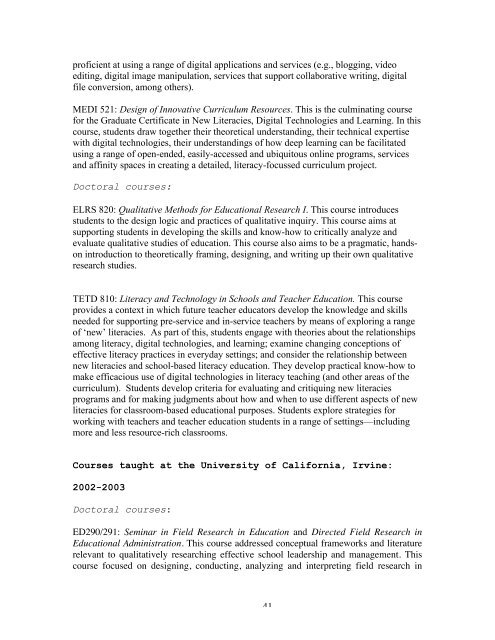Curriculum Vitae MICHELE KNOBEL, PhD.
Curriculum Vitae MICHELE KNOBEL, PhD.
Curriculum Vitae MICHELE KNOBEL, PhD.
Create successful ePaper yourself
Turn your PDF publications into a flip-book with our unique Google optimized e-Paper software.
proficient at using a range of digital applications and services (e.g., blogging, video<br />
editing, digital image manipulation, services that support collaborative writing, digital<br />
file conversion, among others).<br />
MEDI 521: Design of Innovative <strong>Curriculum</strong> Resources. This is the culminating course<br />
for the Graduate Certificate in New Literacies, Digital Technologies and Learning. In this<br />
course, students draw together their theoretical understanding, their technical expertise<br />
with digital technologies, their understandings of how deep learning can be facilitated<br />
using a range of open-ended, easily-accessed and ubiquitous online programs, services<br />
and affinity spaces in creating a detailed, literacy-focussed curriculum project.<br />
Doctoral courses:<br />
ELRS 820: Qualitative Methods for Educational Research I. This course introduces<br />
students to the design logic and practices of qualitative inquiry. This course aims at<br />
supporting students in developing the skills and know-how to critically analyze and<br />
evaluate qualitative studies of education. This course also aims to be a pragmatic, handson<br />
introduction to theoretically framing, designing, and writing up their own qualitative<br />
research studies.<br />
TETD 810: Literacy and Technology in Schools and Teacher Education. This course<br />
provides a context in which future teacher educators develop the knowledge and skills<br />
needed for supporting pre-service and in-service teachers by means of exploring a range<br />
of ‘new’ literacies. As part of this, students engage with theories about the relationships<br />
among literacy, digital technologies, and learning; examine changing conceptions of<br />
effective literacy practices in everyday settings; and consider the relationship between<br />
new literacies and school-based literacy education. They develop practical know-how to<br />
make efficacious use of digital technologies in literacy teaching (and other areas of the<br />
curriculum). Students develop criteria for evaluating and critiquing new literacies<br />
programs and for making judgments about how and when to use different aspects of new<br />
literacies for classroom-based educational purposes. Students explore strategies for<br />
working with teachers and teacher education students in a range of settings—including<br />
more and less resource-rich classrooms.<br />
Courses taught at the University of California, Irvine:<br />
2002-2003<br />
Doctoral courses:<br />
ED290/291: Seminar in Field Research in Education and Directed Field Research in<br />
Educational Administration. This course addressed conceptual frameworks and literature<br />
relevant to qualitatively researching effective school leadership and management. This<br />
course focused on designing, conducting, analyzing and interpreting field research in<br />
41



